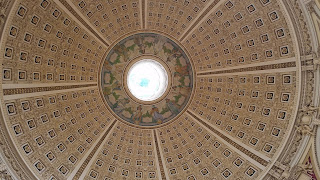My spouse and I visited the Library of Congress (LOC) on a
Monday morning in mid-February 2019. Earlier that morning, we toured the US
Capitol, and our guide recommended visiting the Library of Congress afterwards.
Because we used the underground tunnel to travel between the two buildings, and
because we had already cleared security at the Capitol, we did not need to
re-screen at the Library.
The Library of Congress offers hour-long, docent-led tours on
a first-come, first-served basis for groups of fewer than 10 people. Tours are
offered Mondays through Saturdays on the half-hour from 10:30 am until 3:30 pm.
(On Saturdays, there are no tours at 12:30 or 3:30 pm.) We did not join a tour;
however, we did speak to a docent stationed in one of the rooms who gave us a
brief informative history.
The Library of Congress is the research
library for the United States Congress and is the unofficial national library of the United States. It occupies
three buildings on Capitol Hill, as well as a satellite center in Virginia. The
Library claims to be the largest library in the world, with international
materials available in 450 languages. Originally, the LOC occupied part of the
Capitol until nearly 1900; however, during the War of 1812, the British burned
its collection. Later, to build its collection again, the LOC purchased Thomas
Jefferson’s collection of almost 6,500 books; however, another fire in 1851
destroyed a large part of it. During the latter half of the 19th
century, the Library collection grew enormously, keeping two copies of every
book printed in the US. As the collection grew, the LOB relocated to its present
spot. The LOB now has millions of items in its
collections, including books, recordings, photographs, newspapers, maps, and
manuscripts. Although the goal of the
library is to meet Congressional requests, it is open to the public for
research purposes; however, only government officials can check out books.
Although the collection is impressive, the Thomas Jefferson
Building (one of the four LOB buildings) is an architectural landmark. Completed
in 1897, the Beaux-Arts building features a copper dome (so as not to compete
with the Capitol across the streets) and is adorned with busts of important men
along its portico (Benjamin Franklin, Washington Irving, Ralph Waldo Emerson, Nathaniel
Hawthorne, Sir Walter Scott, Dante Alighieri). At the street level, a fountain
features Neptune and reminds one of Rome’s Trevi Fountain. Inside, the Main
Reading Room is spectacular, as is the Great Hall; painted murals adorn the
ceilings and walls, with some covered in mosaics.


















